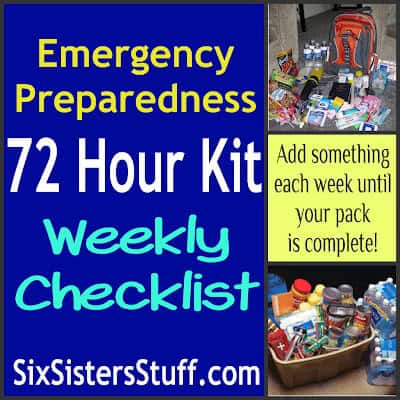
A couple of weeks ago, we had some huge wildfires break out in Utah and many of our friends had to evacuate their homes. Some of them only had a matter of minutes to run through their house and grab things they would need to get through the next couple of days because they didn’t know when they would be able to return (IF they were able to return). In some cases, the police officers stood in their doorway and waited while they ran around, trying to get them out as fast as possible. You might even remember the scary incident our sister Kristen had when she had only a matter of minutes in the middle of the night to get out of her house . . .
In the days since then, I have thought a lot about what I would have grabbed had I been given a couple of minutes to get those things that are most important to me . . . and to be honest, it has kind of been stressing me out. We do have a 72 hour kit, but it’s getting outdated and with a new baby on the way, I have been thinking about the things I need to add to it for our baby.
If you are starting from scratch, it can be pretty intimidating to put a 72 hour kit together. Our sister Elyse shared everything that she put into hers here, so you can check out her list for even more ideas.
Years ago, a good friend gave me a list of how to build your 72 hour kit and be prepared for an emergency over 52 weeks time. When it is broken down week-by-week , it is not such a daunting task. If you wanted to put it together even quicker, you could do 2-3 assignments each week and have it ready in a fraction of the time!
Prepare a separate bag for each member of your family, even the small children. That way if you get separated, at least you know that your family member will have the essential items that they need to get by for a short amount of time.
Disclaimer:
I am in no way saying that this items have to be in your 72 hour kit. These are just some ideas to help you get started. These supplies are very basic and could be kept in an easy-to-carry container in case you had to evacuate in a short amount of time. Each member of your family should have their own 72 hour kit, even the smallest members of your family. Some of the items listed are not appropriate for children (matches, knives, etc) and you can decide what is going to be best for your family members. Anything on this list can be substituted to suit the needs of your family.
- Week 1: Obtain a suitable 72-hour-kit container (backpack, duffel bag, garbage can with lid). Have one for each member of your family.
- Week 2: Check the batteries in your smoke detector.
- Week 3: Place a flashlight next to your bed and one in an alternate location; check batteries. Place flashlight in each of your children’s rooms and let them know where it is.
- Week 4: Add 3 gallons of water to your 72 hour kit (The Red Cross recommends 1 gallon per person per day). The water would take up a lot of room in your pack, so you could keep some water bottles in your pack (maybe about a gallons worth) and keep the rest in containers that can be carried in your arms. Decide what will be best for your family. Sometimes clean water is the most rare commodity in emergencies and not only will it be used for drinking, but also for cleaning. The Red Cross also recommends having a 2 week water supply in your home, just in case clean water is not available.
- Week 5: Add $10 cash to 72 hour kit (the smaller the bills, the better).
- Week 6: Add a manual can opener to 72 hour kit.
- Week 7: Add 2 cans of tuna fish/canned meat to 72 hour kit.
- Week 8: Add 1 roll large paper towels to 72 hour kit.
- Week 9: Add 1 emergency blanket to 72 hour kit.
- Week 10: Add $10 cash to 72 hour kit.
- Week 11: Add 4 rolls of toilet paper to 72 hour kit.
- Week 12: Add 1 bar of soap to 72 hour kit.
- Week 13: Add stress relief factors to 72 hour kit (books, magazines, coloring books, playing cards, games, crossword puzzles, Sudoku, etc).
- Week 14: Add pocket/utility knife to 72 hour kit.
- Week 15: Add $10 cash to 72 hour kit.
- Week 16: Add 1 container of baby wipes to 72 hour kit.
- Week 17: Add 1 change of clothing to 72 hour kit.
- Week 18: Add non-perishable, easy-to-prepare food items to 72 hour kit (granola bars, oatmeal bars, trail mix, beef jerky, canned ravioli, etc. Date for rotation. Get enough to last you for at least 3 days).
- Week 19: Add 1 can of fruit and 1 can of vegetables to 72 hour kit (date for rotation). Make sure they have the pull-tab on top for easy opening.
- Week 20: Add $10 cash to 72 hour kit.
- Week 21: Add 1 box of waterproof matches and 1 lighter to 72 hour kit.
- Week 22: Add hard candy (Jolly Ranchers, Lifesavers) to 72 hour kit.
- Week 23: Add one container of peanut butter (or other protein) to each 72 hour kit.
- Week 24: Add Ziploc bags (variety of sizes) to 72 hour kit.
- Week 25: Add $10 cash to 72 hour kit.
- Week 26: Check the batteries in your smoke detector. Practice escape routes with your family and have an emergency plan.
- Week 27: Add 1 box of crackers and 1 can (48 oz) of non-carbonated fruit juice to 72 hour kit.
- Week 28: Add plastic utensils, paper plates, and a couple of paper cups to 72 hour kit. (I just put enough for 1 person for a couple of meals in a large Ziploc bag).
- Week 29: Add 1 roll of duct tape to 72 hour kit.
- Week 30: Add $10 cash to 72 hour kit.
- Week 31: Add 1 lb graham crackers to 72 hour kit.
- Week 32: Add flashlight to 72 hour kit and extra batteries.
- Week 33: Add disinfectant (betadine, bleach, sterile wipes, hand sanitizer) to 72 hour kit.
- Week 34: Add 1 pair of work gloves to 72 hour kit.
- Week 35: Add $10 cash to 72 hour kit.
- Week 36: Add basic first-aid kit to 72 hour kit.
- Week 37: Add 1 lb dried fruit to 72 hour kit (date for rotation).
- Week 38: Add 1/2 lb dried milk to 72 hour kit. Also add one box of cereal.
- Week 39: Add battery-powered or hand-crank radio to 72 hour kit (add extra batteries if it is battery powered).
- Week 40: Add $10 cash to 72 hour kit.
- Week 41: Add items related to individual medical needs to 72 hour kit. Have at least a 7-day supply. Also include items such as hearing aids (with extra batteries), glasses, contact lenses, syringes, canes, etc.
- Week 42: Add feminine hygiene products, and other hygiene products to 72 hour kit (check out this post for ideas). If you have a baby, add diapers, bottles, formula, and baby food. If you have a pet, add pet supplies (collar, leash, ID, food, bowl, etc).
- Week 43: Add toothbrush and 1 tube of toothpaste to 72 hour kit.
- Week 44: Add a multi-purpose tool to 72 hour kit (ours have scissors on them also, which is nice).
- Week 45: Add $10 cash to 72 hour kit.
- Week 46: Verify each family member’s immunizations (especially tetanus) are up to date.
- Week 47: Purchase additional cell phone chargers for cell phones in your home and add to 72 hour kit.
- Week 48: Add pair of scissors to 72 hour kit.
- Week 49: Add emergency candle to 72 hour kit.
- Week 50: Add $10 cash to 72 hour kit.
- Week 51: Make copies of house keys and car keys to keep in 72 hour kit.
- Week 52: Add photocopies of personal documents to 72 hour kit (wills, insurance policies, birth certificates, medication lists and other medical info, proof of address, deed/lease to home, passports, marriage license, etc). Send 1 copy of each document to family member/friend in separate location. Also add a map of the area and an emergency contact card (with local phone numbers and phone numbers of friends/family outside of the area) to each 72 hour kit. Another idea is to keep pictures of family members in 72 hour kit in case you get separated and need to ask if anyone has seen them.
Additional supplies to keep at home or in your kit based on the types of disasters common to your area:
- Whistle
- N95 or surgical masks
- Rain gear
- Towels
- Tools/supplies for securing your home
- Extra clothing, hat and sturdy shoes
- Plastic sheeting
- Household liquid bleach
- Blankets or sleeping bags
- Two-way radios
- Hand warmers
- Portable fuel source
- Light sticks (makes a great night light, especially for children)
- Pair of flip flops (in case you have to leave in such a hurry that you can’t grab shoes)
Hopefully you won’t have to use these 72 hour kits, but it’s always better to be prepared (and I promise that it will help you sleep a little more soundly at night knowing that you are just a little more ready for any emergency that might come your way!).
For more information, check out the Red Cross’ website for great ideas on how to be ready for an emergency.



















Questions & Reviews